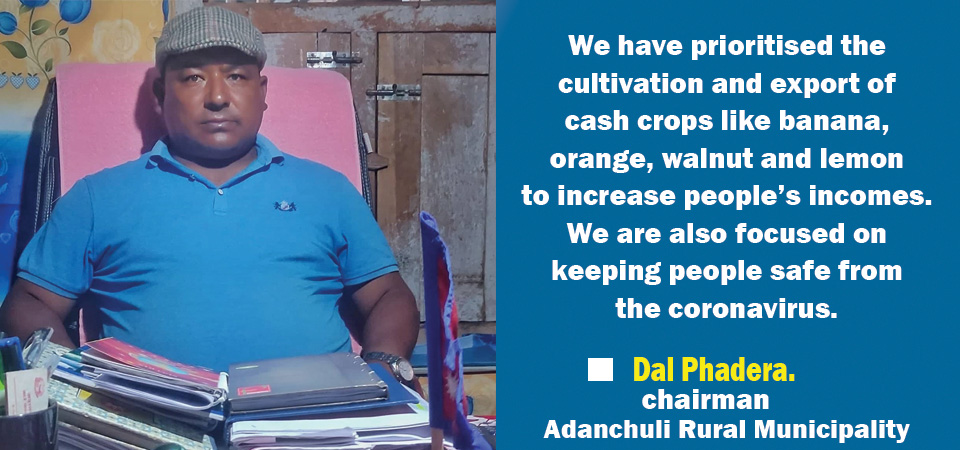'We have expanded health services'

Adanchuli Rural Municipality is a small and remote rural municipality in Humla district. Dal Phadera of the then CPN (UML) was elected chairman of the rural municipality in 2017. During the election, he had promised to work for the development of health, education and infrastructure and work to draft and enact local laws. Our Humla correspondent Rajan Rawat has talked to him about how many of these promises he has fulfilled. Excerpts:
What works have you done since assuming office?
I had not made unrealistic promises during the election. I only promised what I could feasibly do and have been doing that honestly and transparently since entering office. Our geographical remoteness is an obstacle to our development. But still, we have been working the best we can.
We have been able to expand health services in the rural municipality. Adanchuli, which only had two health posts before our election, now it has at least one health institution in every ward. Even the remotest settlements now have access to healthcare. Five of the six wards of the rural municipality have been connected with roads and work is on-going to connect the remaining one wards too.
We are also constructing infrastructure for health and education. We have also worked to promote agriculture and animal husbandry.
Moreover, the rural municipality has formulated and implemented 25 laws. We have been able to do quite a lot despite our remoteness and limited resources.
How much budget have you been able to spend till now? Has your spending been able to yield satisfactory results?
In the past four years, we have spent around Rs. 350 million on development, of which Rs. 210 million was the rural municipality’s own budget while Rs. 140 million was provided by the federal and provincial governments. However, this spending has not yielded satisfactory results which pinches me a lot.
Nevertheless, we feel that we have been able to work for the people. Individual demands cannot and will not be met but we have done a lot for the betterment of the larger community.
What challenges have you faced while working?
Being the first batch of local governments formed under the federal setup, we have faced many challenges. A lack of budget, staff, communication, physical infrastructure and geographical inaccessibility have all hindered our work.
A huge challenge we have faced is the consumers’ old style of working. They think of the rural municipality as yesterday’s village development committee which is not. It is difficult to make them forego personal interests in favour of the communal good while implementing development projects.
Another problem we have had is the politicisation of development by the provincial government. The province only provides projects to its party members and leaves us out. The high cost of materials has also prevented us from executing many plans.
How has the local level coordinated with the federal and provincial governments?
We have no complaints with the federal government. We are in regular contact with the federal level and our work with them has produced great results. Unfortunately, we cannot say the same about the province. The provincial government sets up its own structures in the district which works without any consultation with us. This leads to a lot of waste and duplication. The rural municipality has to monitor the works being carried out in its area but they do not give us any information which leaves the door open for corruption and mismanagement. We have repeatedly tried to extend our hand to the province and raise these issues in the coordination meeting that the provincial government holds with us every year. They always pledge to take our suggestions seriously but we do not see any change in their actions. I believe it’s the same situation all over the country.
What has the rural municipality done to control COVID-19?
We deducted the budget from other sectors and used it to build quarantine centres in all the wards. We also worked with the provincial government to bring Adanchuli’s citizens who were stuck outside the district or the country back home. We also distributed relief to economically vulnerable individuals and acquired health materials to help us fight the coronavirus. Adanchuli did not suffer much because of our good management. All in all, we spent Rs. 15 million in the last two years to prevent and control COVID-19 in the rural municipality.
However, we have begun hearing reports of a resurging coronavirus. We must all take precautions to prevent infection. We have an ample stock of medicines and health items.
What plans do you have for the remainder of your tenure?
We only have a year left in office. In this time, our focus will be to complete all the projects we have started. We will connect all the wards by road. To deliver quality education, we will hire teachers with our own resources. We want to implement exemplary works which will benefit the people and serve as precedents for future local governments.
We have prioritised the cultivation and export of cash crops like banana, orange, walnut and lemon to increase people’s incomes. We are also focused on keeping people safe from the coronavirus.
Recent News

Do not make expressions casting dout on election: EC
14 Apr, 2022
CM Bhatta says may New Year 2079 BS inspire positive thinking
14 Apr, 2022
Three new cases, 44 recoveries in 24 hours
14 Apr, 2022
689 climbers of 84 teams so far acquire permits for climbing various peaks this spring season
14 Apr, 2022
How the rising cost of living crisis is impacting Nepal
14 Apr, 2022
US military confirms an interstellar meteor collided with Earth
14 Apr, 2022
Valneva Covid vaccine approved for use in UK
14 Apr, 2022
Chair Prachanda highlights need of unity among Maoist, Communist forces
14 Apr, 2022
Ranbir Kapoor and Alia Bhatt: Bollywood toasts star couple on wedding
14 Apr, 2022
President Bhandari confers decorations (Photo Feature)
14 Apr, 2022










